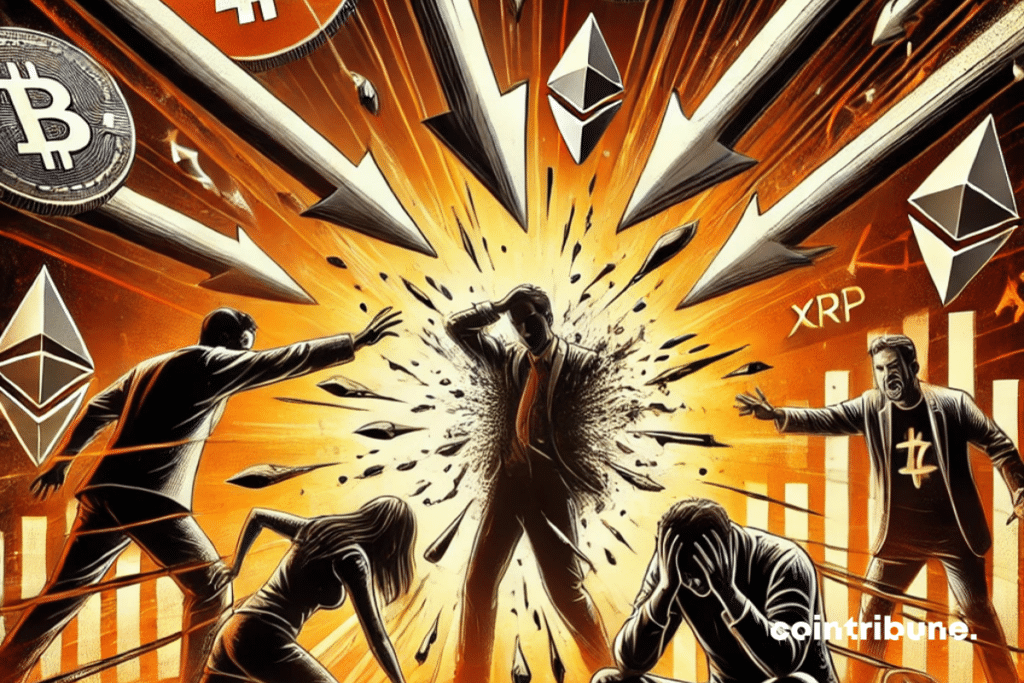7:05 a.m. ▪
4
min read ▪ by
The standoff between the SEC and crypto companies seems never-ending. Today, Ripple’s XRP once again finds itself at the heart of hostilities. Bitnomial, a Chicago-based cryptocurrency exchange, accuses the SEC of overextending its jurisdiction in requiring increased compliance for its XRP futures contracts. The case reignites tensions around XRP’s status as a security, and the crypto industry is beginning to worry about the broader implications across all digital assets.


Bitnomial challenges the SEC: a conflict of jurisdiction
Bitnomial, under the regulation of the Commodity Futures Trading Commission (CFTC), recently requested permission to launch dollar-backed XRP futures contracts.
However, this initiative quickly attracted the attention of the SEC. The agency warned Bitnomial that without registration in accordance with its requirements, the offering of these contracts could violate federal securities laws. Bitnomial disputes this position, arguing that the SEC is overstepping its rights by classifying XRP crypto as a security. However, Ripple achieved a victory.
Behind this confrontation lies a question of jurisdiction. According to Bitnomial, the CFTC is supposed to oversee futures contracts, while the SEC regulates securities.
By calling XRP an “investment contract,” the SEC is attempting to bring these futures contracts under its own control, a step toward more aggressive regulation of the entire industry.
For Bitnomial, this move by the SEC amounts to an attempt at domination, not only over XRP but potentially all digital assets.
In response, Bitnomial filed a complaint, hoping to obtain a judicial declaration that would redefine the classification of these contracts.
If the exchange succeeds, it could set a strong legal precedent, not only for XRP but for all other crypto assets that may suffer the same fate. This affair thus takes on a symbolic dimension, that of a fight for the autonomy of the sector in the face of increasingly intrusive regulation.
Crypto industry faces new uncertainty
This dispute is not limited to XRP. In fact, the potential consequences for the entire sector are profound.
If the SEC succeeds in having XRP recognized as a security in this context, it would pave the way for similar regulation on other cryptos, a worrying prospect for investors and market participants.
Already, companies like Crypto.com have also filed lawsuits against the SEC, denouncing what they see as an overly broad and unfounded approach by the agency.
The impact of this case is being felt in the current crypto market atmosphere. Investors, worried about these repeated legal battles, are beginning to lose confidence and sales movements are accelerating.
Regulatory uncertainty sows doubt about the robustness of crypto investments, leading to increased volatility. XRP destabilization extends to other assets as investors fear further SEC attacks on other projects.
For defenders of cryptocurrencies, these actions seem counterproductive. Instead of clarifying the rules, the SEC exerts pressure that ultimately erodes the industry’s credibility. Influential figures in the industry, like the CEO of Bitnomial, believe these decisions harm innovation and hinder crypto adoption. For them, this is a battle to be fought not only for Bitnomial or Ripple but for the entire crypto ecosystem. Meanwhile, China is collapsing.
Maximize your Cointribune experience with our “Read to Earn” program! For every article you read, earn points and access exclusive rewards. Sign up now and start enjoying benefits.


Fascinated by bitcoin since 2017, Evariste has never stopped researching the subject. If his first interest was in trading, he is now actively trying to understand all the advances centered on cryptocurrencies. As an editor, he aspires to continually deliver high-quality work that reflects the state of the industry as a whole.
DISCLAIMER
The views, thoughts and opinions expressed in this article belong solely to the author and should not be considered investment advice. Do your own research before making any investment decisions.




